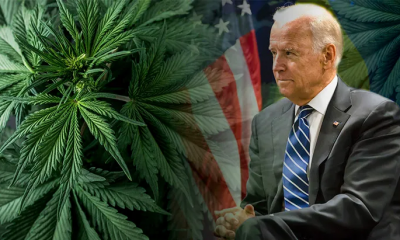The 9th edition of Europe's leading cannabis conference, the Cannabis Europa, returned last week to the Barbican Center for the first time since its creation in 2018, bringing together more than a thousand industry leaders, policy makers from across the European Union and patient representatives. Ben Stevens, editor of Business of Cannabis, made a great summary of the two days of the conference, which we share with our readers here.
Opening session remarks
The CEO of Prohibition Partners, Stephen Murphy, welcomed attendees to the Barbican amphitheater on the morning of Tuesday 2 May, hailing the venue as a “beacon for creativity” in the UK and stating that the need for “creativity in industry of cannabis” was also “so essential”.
Going back to the first Cannabis Europe in 2018, Murphy recalled that there were “little to no patients, companies or regulations” across the EU. He added that while it's easy to get frustrated with the lack of change and pace in the sector, we must remember how far has come in such a short time. Furthermore, he highlighted that there is still a need for integration of patients across the sector and that it must continue to place patients at the center of its business models.
With that in mind, he welcomed the event's main sponsor, Jorja Emerson Centre's managing director, Robin Emerson, to the stage. During his keynote address, Emerson told the audience that this was a "surreal moment" for him, having started out, like many in the audience, as a family member of a medical cannabis patient. He told the story of his daughter, Jorja, and the improvements medical cannabis has brought her, saying that “naturally, I decided to make medical cannabis my life”.
He then revealed to Cannabis Europa exclusively that Jorja's story will soon be told in a documentary, with the aim of generating greater awareness, greater access and helping his company to "shake up the industry".
State of Play – Germany
The first of a trio of 'State of Play' discussions in the morning session centered on Germany, which, following the dramatic change in direction announced by the country's government last month, drew a huge crowd, leaving the amphitheater packed to capacity.
Beginning with a scathing question from the panel moderator, Krautinvest Editor-in-Chief Moritz Förster on the panel's satisfaction with the newly announced policy document, Dirk Heitepriem of BvCW said: "As an industry, we expected more, but we always knew it would be a marathon, not a sprint.” Agreeing that anything about cannabis liberalization put into law is a positive step, he stipulated that the "first pillar will not be easy" to implement.
“As a not-for-profit structure, there seems to be no other role for the industry than to support”, he added, stating that the second pillar of the pilot study was, conversely, a “great opportunity”. “We need to move very quickly or we will allow the illicit market to flourish.”
Bloomwell Group co-founder Dr. Julian Wichmann, told the room that for him the most important part of the new legislation was the "reclassification", but continued that this could happen in 2024 or later.
As for the industry's role in a market centered around cannabis social clubs, the panel agreed that while this is "definitely not a framework that will replace the illicit market", it has a key role to play in sharing the knowledge base it has been building. for six years, ensuring that the project does not 'start from scratch'.
While speculation about upcoming pilot projects is tentative, given the lack of details provided by the government so far, the panel said data obtained during that process would be crucial to "convincing more EU states to change policy".
Czech Republic
The panel then turned its attention to the Czech Republic, where the country's national drugs coordinator, Jindřich Vobořil, said he now believed there was enough data from alcohol and tobacco markets to prove that prohibition does not reduce harm, but regulation yes.
In a panel moderated by journalist Robert Veverka, Vobořil added that the Czech Republic is now “lonely in its quest” to launch a full commercial market and that it is “still working out a proposal for a commercial market and sale in dispensaries and pharmacies”. While stating that there was still no consensus in his own coalition on how to move forward with this, he believes it is “possible or I wouldn't push for it; I'm too old to waste my time on something I can't do'.
“It is very difficult to have an EU-wide debate on cannabis because countries have very different opinions and legal frameworks. The EU is a great idea, but very bureaucratic and, in many ways, very backward. “The way forward is what we are doing. Individual states will change their laws and put pressure on the EU.
“Conferences are good, but we need to take concrete steps. I will say it frankly… we need strong lobbying and campaigns, put some money on the table and remove unnecessary anxiety from politicians by educating them.”
Switzerland
The final 'State of Play' session turned to Switzerland, which, as Cannavigia CEO Luc Richner has pointed out, is now seen as a European frontrunner in its efforts to liberalize cannabis.
He added that one fact about the Swiss model that "often fails" is that the country's authorities "allowed everyone to come together and present studies on how this could work", which he saw as a "forward-looking approach". . “Even in a small country, there are so many approaches to what it's going to be like, and I think that's really important for what's happening in Europe. I don't think we have the answer, because nobody has the answer. I think we can help inform.”
Harm reduction and the legal market
Subsequently, the focus shifted from policy to the potential impacts of those policies on patients and cannabis users.
In a panel focused on harm reduction, Surrey Police and Crime Commissioner Lisa Townsend said she feared that the UK's two main political parties were preparing for a "war on crime... an arms race which, in Ultimately, it will benefit no one.” She added that while she did not subscribe to cannabis as a gateway drug argument, it was becoming a gateway drug for criminal gangs who traditionally focused on the cocaine trade but are increasingly switching to cannabis. .
Turning to current developments in Ireland, Irish MEP Luke Ming Flanagan said he hoped the current Citizens' Assembly on cannabis would have a positive impact on both public opinion and government policy, citing the success of similar initiatives about gay marriage and abortion.
“Many people were skeptical about the (citizens' assembly) expert group, but after watching the first few debates it was clear that the citizens of Ireland are way ahead of the political norm on the issue. There will not be a referendum on this, but it will put pressure on politicians. “It's not as progressive as I would like, but the citizens' assembly will take it forward. Politicians in Ireland would legalize eating raw chicken if it were recommended by an assembly of citizens. “Looking at opinion polls in the UK, it has never been easier politically to talk about legalizing cannabis. I struggle to see why a major UK political party is not supporting this – you will lose votes and not know what to do with them.”
Bell Ribeiro-Addy, a Labor MP, said there was currently a "mixed message" about cannabis, which is still criminalized despite a thriving private medical industry. He also raised the issue of disproportionate criminalization in the UK, despite there being no evidence of increased drug use in communities of color. This point was explored in much more detail in the final session of the day by Unjust CIC founder Katrina French, who said, "As a black male, you are nine times more likely to be stopped and searched for cannabis." “We are talking about people of color who are seen as criminals, while white people are seen as pioneers… It is up to companies and governments to understand how prohibition has hurt these communities.”
Investor's focus
The afternoon began with a succession of panels that delved into investors' perspectives. Panellists for the first session, titled 'A Gear Shift for Cannabis in Europe', joked that it was probably more of a 'handbrake' in the last 12 months. After warning that the session was unlikely to get off to a "buoyant start", Southbank Investment Research editor and chief investment officer Sam Volkering suggested that if a company "isn't profitable or doesn't have enough cash, nobody wants to put money anywhere near it." of yourself'.
Sean Stiefel, CEO of Navy Capital, said that in his opinion “the biggest detriment to investment is the lack of regulatory clarity; even if you think the business is good, you have no idea how long they're going to last.' “It won't take long for the sector to liven up again. On the other hand, in the last year or two, you've seen business models that just don't work.” For companies that failed, he suggested that consolidation was not something his company was “optimistic” about, as there were still high barriers to transferring licenses and many of their facilities are outdated.
Regarding the news that financial giant Euroclear had recently moved away from cannabis altogether, Nick Davis of Memery Crystal said: “The Home Office can help with that very quickly. Jersey cleared up the Proceeds of Crime Act – it wasn't a particularly difficult thing to do. Not only is there uncertainty around the factory, but in the UK you have this proceeds of crime problem. “If you are an investor in 2023, with cannabis we are probably taking more risks than ever before and the markets are risk averse. You have to be a good frontier investor to take these risks right now. I still believe the payoffs are there.”
The market was similar on the other side of the Atlantic, according to Stiefel, who told the audience, “Liquidity for US operators is the lowest ever. It is harder for an investor to wake up and decide to invest in cannabis than ever before. In addition, there are the fewest interesting companies that can be invested in that have ever existed in cannabis.”
Echoing the panel's earlier statements, Stiefel said it was becoming clear that the cannabis industry will never support hundreds of thousands of companies, but that, like alcohol, there will be "a few clusters, a bunch of artisans and regional guys". “I would say that, at least in the United States from now until the end of time, there will be fewer cannabis companies.
“I still believe that the US will reach a market of 100.000 billion. So we think there are a lot of advantages to whoever gets it and every day it becomes more and more clear who it will be.”
Day 2 summary will be published soon.
This article was originally published by Ben Stevens at Business of Cannabis.








































